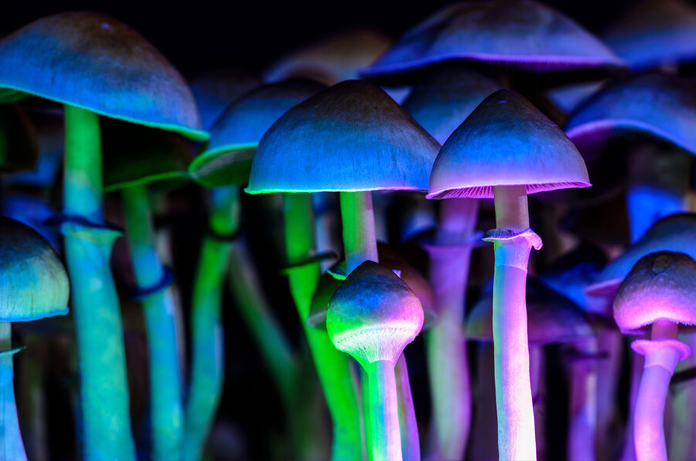
A psychedelic experience is a temporary altered state of consciousness induced by the consumption of a serotonergic psychedelic substance. For example, an acid trip is a psychedelic experience brought on by the use of LSD, while a mushroom trip is a psychedelic experience brought on by the use of psilocybin. Psychedelic experiences are induced in many contexts including exploratory, recreational, religious, and mystical however science is beginning to recognize the therapeutic benefits of these substances in the treatment of TBI.
THE CHEMICAL COMPOUNDS
Several psychedelic compounds are being studied as treatments for TBI. Two that are at the forefront of this research are psilocybin and ibogaine.
Psilocybin is one of the many compounds found in magic mushrooms (aka psilocybin mushrooms or psychedelic mushrooms). It is a prodrug of psilocin, the main compound responsible for the psychedelic effect of magic mushrooms.
Ibogaine, which is extracted from the iboga shrub, was used by West African communities for centuries in both rituals and healing ceremonies, this psychedelic did not make its way into the western world until 1864. In 1970, the FDA classified ibogaine as a Schedule I drug alongside other psychoactive drugs such as psilocybin and LSD. However, in recent years — with the resurgence of psychedelics in therapeutic research — the regulatory landscape is once again becoming more favorable.
“Ibogaine could be crucial for the treatment of brain trauma and neuropathic pain.” says a spokesperson for MINDCURE. “The substance has been thought to stimulate the growth of new dopamine neurons and repair and reset the brain’s reward system.”
THE COMPANIES BEHIND THE RESEARCH
Many companies and organizations are researching psychedelics for the treatment of TBI. Mental health and wellness company MINDCURE recently announced its efforts towards researching psychedelics for the treatment of TBIs. The company identified opportunities for the treatment of traumatic brain injuries using a psychoactive substance called ibogaine. Leading the charge for MINDCURE’s trauma and head injury research is Dr. Engle, Board Certified in Psychiatry and Neurology, with a clinical practice that combines functional medicine, integrative psychiatry, neuro-cognitive restoration. He is also the author of the book The Concussion Repair Manual. Dr. Engle calls this era in brain health a “psychedelic renaissance in the redemption of modern psychiatric care.” In other words, this is where the market is headed. Not only are there more decriminalization efforts being made against psychedelics, but we also see increased FDA approvals for its therapeutic use, as well as renowned hospitals like John Hopkins, launching their departments for psychedelic research.
Wesana Health is a private life sciences company that has announced plans for TBI research. CEO Dennis Carcillo is a former National Hockey League player. Throughout his NHL career, Carcillo sustained several TBIs. As the cumulative toll from these injuries increased, Carcillo sought treatment but nothing seemed to work. “I thought I was hopeless because I tried everything. I read every paper. And I couldn’t help myself. That’s when suicidal ideation crept in for the first time in my life. It got really scary.” said Carcillo. “After my first effort at self-medicating with psilocybin, I felt like the brain fog and fatigue start to lift. It just got better progressively as the days went on.” After six months, Carcillo was told his brain scans showed noticeable improvement. Today, as Wesana’s CEO, Carcillo wants to bring psilocybin-based relief to other TBI sufferers, but via licensed-and-approved drugs, and alongside formal psychotherapy.
FROM MENTAL HEALTH TO BRAIN HEALTH
It has been well established that psychedelics have the potential to help psychiatric patients. “Psychedelic compounds have the potential to bring significant improvement to the lives of many individuals suffering from mental illness,” said Brian Barnett, M.D., Center for Behavioral Health, the Cleveland Clinic.
The movement from psychedelics for mental health symptoms to psychedelics for overall brain health seems obvious and researchers have been looking at this progression for decades. For example, the Johns Hopkins School of Medicine opened the Center for Psychedelic and Consciousness Research in Baltimore. “Our scientists have shown that psychedelics have real potential as medicine, and this new center will help us explore that potential,” Paul B. Rothman, M.D., dean of the Johns Hopkins University School of Medicine and CEO of Johns Hopkins Medicine, said on the Center’s website. With $17 million in funding from private donors, the Center is the first research center of its kind in the U.S. and the largest such center in the world.
Although more research is needed on the subject, it seems clear that science is working towards and possibly close to harnessing psychedelics for good and TBI patients will certainly benefit.